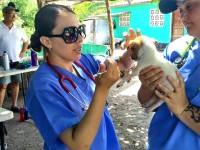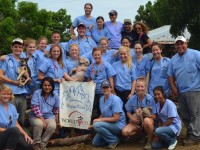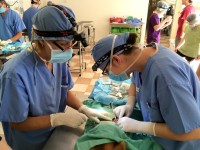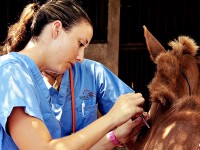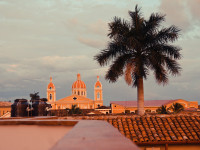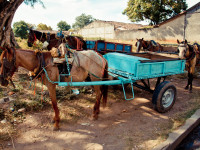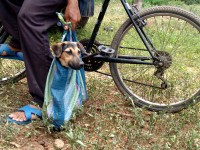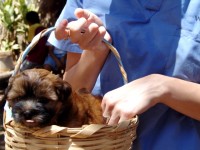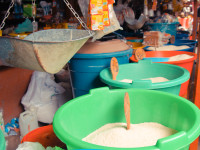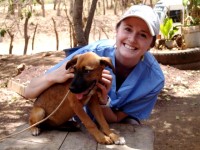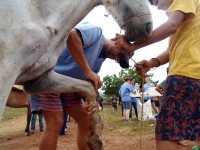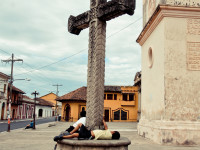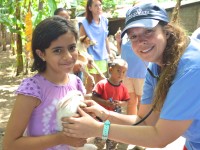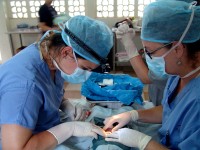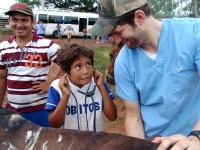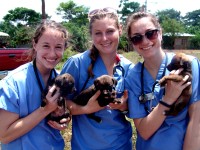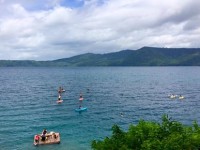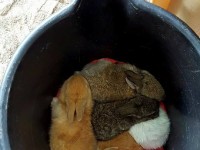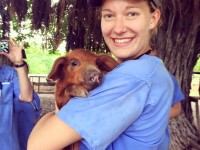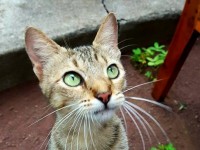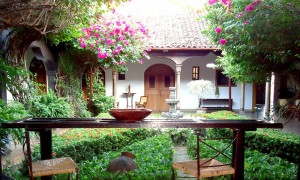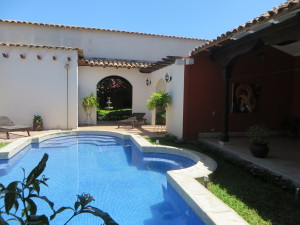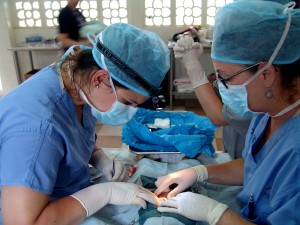 The International Veterinary Medicine (IVM) Program is World Vets student program. Operating out of our Latin American Veterinary Training Center in Granada, Nicaragua, it provides international students with an opportunity to
The International Veterinary Medicine (IVM) Program is World Vets student program. Operating out of our Latin American Veterinary Training Center in Granada, Nicaragua, it provides international students with an opportunity to 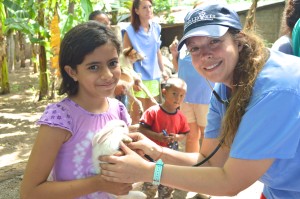 gain practical veterinary experience. Students will receive one on one instruction in relation to the preparation, execution and recovery of patients from spay and neuter surgery. Students stand to benefit from this multi – disciplinary training and cultural experience as it will enhance their education and give them a broader understanding of
gain practical veterinary experience. Students will receive one on one instruction in relation to the preparation, execution and recovery of patients from spay and neuter surgery. Students stand to benefit from this multi – disciplinary training and cultural experience as it will enhance their education and give them a broader understanding of 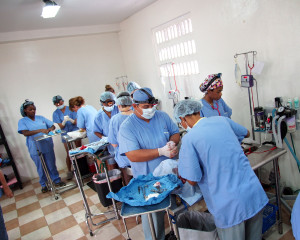 international veterinary medicine.
international veterinary medicine.
World Vets Latin American Veterinary Training Center is equipped with gas anesthesia, central oxygen, pulse oximeters, fluid pumps, an autoclave, centrifuge and ultrasound equipment. We are also able to perform some basic diagnostic tests such as blood and tissue smears, fecal flotations, PCV/TP, and urinalysis.
All surgeries are performed on community animals that require sterilization. Members of the local community own most of the surgical patients, but homeless cats and dogs are also considered for sterilization. These much needed spay/neuter services, as well as any additional medical treatments, are provided free of charge to Nicaraguan pet owners and the community.
Although it is a training facility, patient care and patient needs are always our top priority, so patient comfort and appropriate pain management is always implemented.
Read more about the student experience here
How much will it cost?
Students:
The Winter IVM Program fee for pre – veterinary, veterinary and veterinary technology students is $1550 USD, however, we will only require a deposit of $400 USD at the time of registration. The remaining amount ($1150 USD) should be paid via a personal check made out to World Vets and be payable in US currency by April 20, 2015. Credit cards and money orders are also accepted forms of payment. If you register after this date, we will require the remaining balance within 5- 7 business days from the date of your original registration.
What’s Included for students:
World Vets scrub top, volunteer kit, pre – trip planning and coordination per the program itinerary, accommodations for 7 nights, breakfast, lunches on clinic and outreach days, airport transfers per established meeting times, ground transportation on outreach days, one on one instruction, a group activity (carriage ride and boat tour) as well as all supplies and full participation.
What’s NOT included for students:
Airfare, optional excursions, travel and/or health insurance, World Vets membership fee, dinner and snacks, Nicaraguan tourist visa ($10 USD paid upon arrival), personal equipment necessary for the course (i.e watch, stethoscope, water bottle), incidentals and anything not specifically outlined as included.
DVM & LVT/RVT Instructors:
Licensed veterinarians and technicians must have at least one year of clinical experience to qualify for an instructor position, however, prior teaching experience is not a prerequisite. If you would like to be considered for an instructor position, please send a copy of your current CV and DVM and/or LVT/RVT license to info@worldvets.org. This is a low cost volunteer opportunity.
- Read more about the DVM experience and the costs you will incur here
- Read more about the LVT/RVT experience and the costs you will incur here
- *Use your CE allowance to participate: Learn more
What will I be doing?
Veterinary Students
You will have the opportunity to perform spay and neuter surgeries in a low stress environment with your own experienced DVM instructor to guide you through the entire process. It doesn’t matter if you are a first year or fourth year veterinary student, or what your level of surgical experience is, you will be allowed to work at your own pace and perform as much of the surgical procedure as you and your instructor are comfortable with. Our goal is for you to be competent at performing uncomplicated spay and neuter surgeries by the end of the program. You will also assist pre – veterinary and technician students with pre – operative and post-operative procedures on your patients.
Pre – veterinary and Technician Students
You will work under the guidance of licensed technician and veterinary instructors. You will learn how to prepare patients for surgery, such as performing complete physical exams, administering pre-anesthetic medications, catheter and endotracheal tube placement, bladder expression, anesthetic induction, and monitoring of patients while under anesthesia. You will also assist with post-operative recovery of patients. This program is targeted at students who do not have significant clinical experience and have not worked extensively in a veterinary clinical setting. If you already have extensive experience with the above mentioned procedures, this program is probably not going to fulfill your needs. You should instead look toward volunteering on one of our regular international field service projects.
DVM Instructors
You will work one-on-one with veterinary students to teach spay and neuter surgery. We would like for you to teach students your technique so that they are exposed to several different approaches. No prior teaching experience is required although you must be comfortable performing and teaching basic spay and neuter surgery.
LVT/RVT Instructors
You will work one-on-one with pre veterinary and technician students to teach them basic clinical skills such as preparation of patients for surgery (pre-med, placing catheters, intubation etc.), performing physical exams, basic anesthesia concepts and patient recovery. No prior teaching experience is required, although you must be comfortable performing and teaching basic patient surgical preparation, monitoring and recovery.
Will I have the opportunity to perform other types of veterinary procedures?
Yes, we have planned multiple community outreach clinics where you will have an opportunity to help a rural Nicaraguan community, interact with local residents and evaluate and treat local animals that often have conditions not commonly seen in US pet populations (i.e. ehrlichiosis, TVT, severe malnutrition and tick infestations, etc). During these clinics you will be working alongside US and Nicaraguan veterinarians to provide free vaccinations, deworming and basic treatments to local small animals.
As part of community outreach clinics, we will also be seeing and treating horses. Students will be able to vaccinate, deworm and treat other common medical conditions. This is a good opportunity for you to get comfortable working around horses and to practice some basic procedures such as giving IM and IV injections, trimming feet, etc.
Will I have free time to explore the area?
Yes. World Vets will arrange one day for the group to take a horse carriage ride tour of the historical downtown district of Granada, followed by a boat expedition around the islets of Lake Nicaragua. This will give you the opportunity to get acquainted with your local surroundings, as well as interact with other members of the group. Please note that the horses on the carriage ride are recipients of free veterinary services as a result of World Vets equine welfare project in the city.
There are two additional days with no scheduled activities so you are free to make your own arrangements. There are several tour companies in Granada that can arrange day trips to various places such as shopping at the market in Masaya for handicrafts and souvenirs, hiking or ziplining at Mombacho volcano, trips to the beach or surfing in San Juan del Sur, and horseback riding to name a few. There are also several spas in Granada that offer massages, manicures, pedicures etc.
A few special notes:
- Participants are responsible for obtaining any travel documentation required of them to enter/exit Nicaragua (i.e. a passport that is valid for at least 6 months from the date of departure, special visa if applicable).
- Participants are responsible for obtaining any health requirements and/or precautions (i.e. vaccinations) prior to departure and its associated cost. World Vets is not able to provide medical advice. Participants are encouraged to consult with their family physician, nearest travel clinic and/or center for disease control regarding recommended immunizations and/or health precautions prior to the trip. We require all volunteers to have some form of health insurance.
- We understand that sometimes unexpected things can happen to stop a volunteer being able to participate in a project. For that reason, we highly recommend that you obtain some form of insurance for your trip. Affordable travelers insurance can be found here, which can also cover trip cancellation in some circumstances and covered reasons. You must read the policy wording to ensure the policy is a fit for your needs. World Vets project fees are non-refundable and non-transferable (to another person or to another project). We encourage volunteers to make sure the dates of our projects do not conflict with any prior engagements before signing up.
- World Vets is able to accommodate vegetarians on this program. However, we will not able to accommodate any specialty diets such vegan and/or gluten free etc. Those who have strict dietary restrictions will need to bring their own supplements and/or snacks for the program. Nevertheless, there are many restaurant options in Granada for vegetarians, vegans etc.
- The gloves provided as part of this program are made with latex. If you have a latex allergy, you will need to supply your own gloves for this program.
- The International Veterinary Medicine (IVM) Program is for instructors and students respectfully. We are not able to accommodate any children (under the age of 18) of instructors should they not be participating in the capacity of student.
- Please read and make sure you understand World Vets Terms & Conditions. World Vets is not liable for lost and/or stolen items a program housing and/or training center facility.
-
Itinerary
Day 1 (Wednesday, June 15): Official Arrival Day
Today marks the official arrival day of the program. Arrive at Augusto C Sandino International Airport located in Managua, Nicaragua. Airport code: MGA. Please plan to arrive no later than 10:00 pm – this will be when the last World Vets shuttle will operate to Granada (~1 hour drive south). There will be two shuttles operating for airport picks up. In general this is how they will be scheduled:
Shuttle #1: Anyone arriving before 4:00 PM
Shuttle #2: Anyone arriving between 4:00 PM – 10:00 PM
Once you have booked your flight, please send your flight information (i.e. arrival/departure date and time, airline carrier, flight numbers) to . We require your flight information no later than April 20, 2016. If you register following this date, you will need to get us your flight information within 3 -5 days of your initial registration date.
Anyone arriving before the official arrival day will be responsible for their own transportation to Granada. Similarly anyone arriving after 10:0 PM on the official arrival day will need to make their own transfer arrangements.
Day 2 (Thursday, June 16): Group Activity & Orientation
This morning you will take part in a group activity followed by orientation at the training center in the afternoon. After breakfast provided at your accommodations, participants will hop in a horse drawn carriage for a tour of the city. These horses are recipients of free veterinary services as a result of World Vets equine welfare project in the city. You will then be taken to Lake Nicaragua and get on a boat for a tour of Las Isletas (“Little Islands”). Once the tour is complete you will lunch at the training center followed by orientation. The evening is free for participants to explore.
*Breakfast and lunch included for both students and instructors
**Everyone is responsible for their own dinner tonight
Day 3 (Friday, June 17): Training Center Clinic Day
Today students and instructors will work out of World Vets training center and provide free spay/neuter services for community animals in need of the operation. Students will receive one on one instruction and have the opportunity to work with the following equipment; gas anesthesia, central oxygen, pulse oximeters, fluid pumps and an autoclave. There may also exist the opportunity to perform basic diagnostic tests such as blood and tissue smears, fecal flotations, PCV/TP, and urinalysis. Read more details under the project description (first page).
*Breakfast and lunch included for both students and instructors
**Everyone is responsible for their own dinner tonight
Day 4 (Saturday, June 18): Training Center Clinic Day
Today students and instructors will work out of World Vets training center and provide free spay/neuter services for community animals in need of the operation. Students will receive one on one instruction and have the opportunity to work with the following equipment; gas anesthesia, central oxygen, pulse oximeters, fluid pumps and an autoclave. There may also exist the opportunity to perform basic diagnostic tests such as blood and tissue smears, fecal flotations, PCV/TP, and urinalysis. Read more details under the project description (first page).
*Breakfast and lunch included for both students and instructors
**Everyone is responsible for their own dinner tonight
Day 5 (Sunday, June 19): Leisure Day
Take advantage of your day off and explore the area! World Vets will have activities that we can arrange and you can sign up for upon your arrival. All other activities you will need to make your own arrangements for. Any and all activities you take part in will today will be at your own expense.
*Breakfast included for both students and instructors
**Everyone is responsible for their own lunch and dinner today
Day 6 (Monday, June 20): Community Outreach Day
Today will be dedicated to providing a community outreach clinic. Students will be involved in assisting with health consultations and administering vaccines and preventative health medicines to cats and dogs. We will also be attending horses that show up allowing students to assist with administering vaccines and preventative health medicines to horses as well as cleaning and treating wounds and abrasions.
*Breakfast and lunch included for both students and instructors
**Everyone is responsible for their own dinner tonight
Day 7 (Tuesday, June 21): Training Center Clinic Day
Today students and instructors will work out of World Vets training center and provide free spay/neuter services for community animals in need of the operation. Students will receive one on one instruction and have the opportunity to work with the following equipment; gas anesthesia, central oxygen, pulse oximeters, fluid pumps and an autoclave. There may also exist the opportunity to perform basic diagnostic tests such as blood and tissue smears, fecal flotations, PCV/TP, and urinalysis. Read more details under the project description (first page).
*Breakfast and lunch included for both students and instructors
**Everyone is responsible for their own dinner tonight
Day 8 (Wednesday, June 22): Official Departure
Today marks the official end/departure day of the program. There will be two shuttles operating for return airport shuttles. In general, this is how they will be scheduled:
Shuttle #1 for early morning departures (i.e. 6 AM, 7:45 AM)
Shuttle #2 for early – late afternoon departures (i.e. 12 PM, 2 PM)
For participants who wish to extend their stay, this is something that is not included in the program fee. Also, please know that if you stay past the official end date of the program, you will then be responsible for your return transportation to the airport.
Accommodations
All program participants will stay at a colonial style home with beautiful gardens located just a few blocks from the center of town and within walking distance to restaurants, shops and World Vets training center. The house has hot water, a fully equipped kitchen, cable, air conditioning in rooms, ceiling fans throughout and a newly installed pool. Accommodations and living quarters will be shared. Students can expect to room with at least two or three other students. Breakfast will be cooked and served each morning at the house.
General Packing List
*NOTE: This is a general packing list.
Please research your project's forecast information for weather permitting items.
- Shoes (anything comfortable w/ covered toes for clinic days)
- World Vets scrub top (required during clinic days)
- Scrub pants (optional)
- Pants
- T-shirts (weather permitting)
- Shorts (weather permitting - shorts are ok for surgery)
- Bandana/hat
- Swimsuit (weather permitting)
- Sweatshirt (weather permitting)
- Light jacket (weather permitting)
- Pajamas
- Underwear
- Socks
- Sunglasses
- Water bottle (highly recommended)
- Headlamp (highly recommended)
- Camera
- Tote bag
Toiletries:
- Toothbrush
- Toothpaste
- Shampoo
- Prescription medications
- Over the counter meds (Tylenol, Imodium, cold meds etc)
- Personal bottle of hand sanitizer (highly recommended)
- Soap
- Sunscreen (highly recommended)
- Bug spray (DEET) (highly recommended)
- Brush
- Band-Aids
- Glasses/contact lenses
Extras:
- Beach Towel (if applicable)
- Ear Plugs
- Flip Flops/Shower shoes/Water shoes




